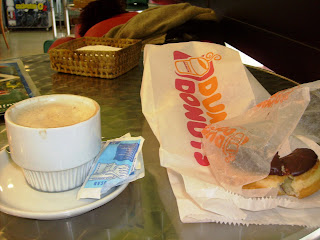 I become more convinced every single day that one of my roles in life—at least thus far—has been to observe the American zeitgeist from abroad.
I become more convinced every single day that one of my roles in life—at least thus far—has been to observe the American zeitgeist from abroad.
No, really.
Exactly ten years ago I was a wide-eyed exchange student to Spain, where I used my limited, poorly-pronounced Spanish to explain concepts I was barely familiar with in English: impeachment, perjury, and dare I say, fellatio. I was in Chile in 2003, when the War in Iraq began. My Spanish was far better by that point, but since my outlook differed so radically from my hosts’, I became uncharacteristically tight-lipped. Now, for the third time in my life, I watched from distant shores as America redefined itself yet again.
I would be lying if I said I wasn’t nervous last Tuesday. But as the BBC commentators relaxed and announced Obama the winner early in the night, all I could do was smile and follow suit. As Virginia came out blue and then North Carolina, Hawaii and then California, I knew I could sleep well and wake to a new day in American politics.
And that’s exactly what I did. I got up early last Wednesday, breathing a little bit deeper—head held just a little bit higher. When I went to the store for some croissants and milk, the owner asked me what I thought: victory or tragedy? I just smiled and told him I was “Contenta. Más que contenta, de hecho: contentísima.”
I don’t know if all Uruguayans are as excited as I am about Obama’s victory. People are generally distrustful of politicians here, and some, like journalist Edwardo Galeano, are skeptical a single leader will be capable of dismantling and reassembling our malfunctioning political system. He writes: “¿Podrá cambiar el rumbo asesino de un modo de vida de pocos que se rifan el destino de todos? Me temo que no, pero ojalá que sí.”
What does seem to have people abuzz in Uruguay, where voting is compulsory and everyone seems to have an opinion regarding politics, is that Americans from all walks of life came out en masse (and with so much passion!) for this election. Like most people here and the world over, we were patient and determined as we stood in line for hours and mailed in absentee ballots, just to have our voice heard. Here they seem less concerned about race than the fact that Americans finally motioned for other important changes—in ideology, rhetoric, perspective—and defended the nation’s founding principles. In fact, one friend even told me that, although he resents “Yankee imperialism,” he finds his respect for democracy in America renewed.
I have to say I agree with him. I’m proud that people my age overcame their disenchantment with the voting process, and I’m proud that people my brother’s age made their first experience so meaningful. And as long as I’m away from home and far from the people I love the most—and all things familiar—I’m proud just to be a conscientious observer.
 But maybe—just maybe—Christmas started earlier that morning, as I opened my eyes and drew in my first conscious breath of the day, suddenly unsure what to expect from what would have been the most familiar of days.
But maybe—just maybe—Christmas started earlier that morning, as I opened my eyes and drew in my first conscious breath of the day, suddenly unsure what to expect from what would have been the most familiar of days.

 For this, and many other things, I am thankful.
For this, and many other things, I am thankful. 








































 It had all of the makings of a traditional Fourth of July celebration: cotton candy, hotdogs and hamburgers with all the right condiments, hordes of Americans milling about, indiscriminately double dipping and discussing pleasantries, like the weather and the potato sack race taking place outside. The only thing that made my Fourth of July different this year was the fact that I celebrated it on a cold day in July (which still sounds funny to me, if nothing else because it’s slightly reminiscent of another saying we have in English) in downtown Montevideo, Uruguay. To be more exact, from exactly 12-3 pm last Friday afternoon the neatly manicured lawn of the US Ambassador to Uruguay, Frank Baxtor, better resembled the setting of a Tennessee-style barbeque than the residence of an international dignitary.
It had all of the makings of a traditional Fourth of July celebration: cotton candy, hotdogs and hamburgers with all the right condiments, hordes of Americans milling about, indiscriminately double dipping and discussing pleasantries, like the weather and the potato sack race taking place outside. The only thing that made my Fourth of July different this year was the fact that I celebrated it on a cold day in July (which still sounds funny to me, if nothing else because it’s slightly reminiscent of another saying we have in English) in downtown Montevideo, Uruguay. To be more exact, from exactly 12-3 pm last Friday afternoon the neatly manicured lawn of the US Ambassador to Uruguay, Frank Baxtor, better resembled the setting of a Tennessee-style barbeque than the residence of an international dignitary.






